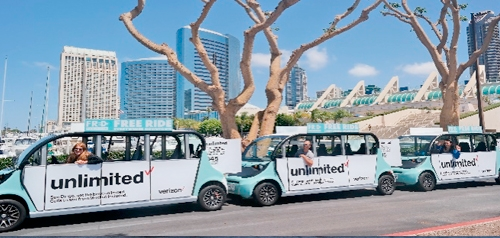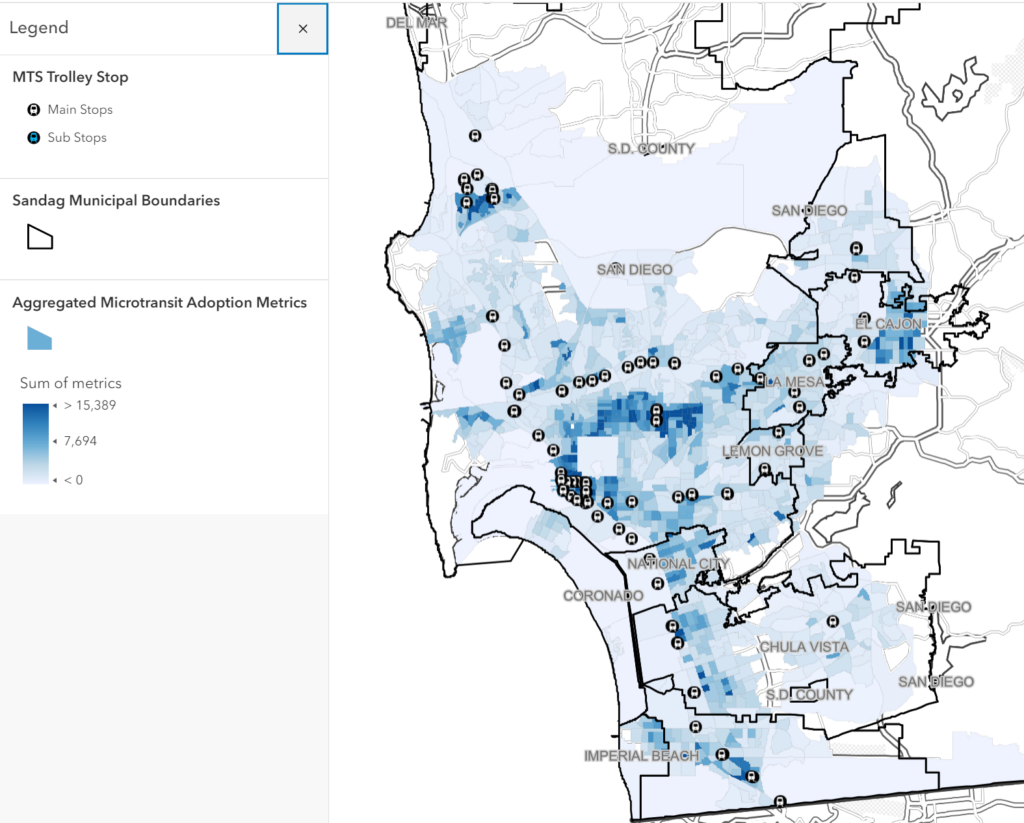New SD350 Mapping Tool Identifies Areas of Greatest Need
By Sanjiv Nanda and Wendy Mihalic on SanDiego350’s transportation team

SanDiego350’s Microtransit Subteam, has developed a new capability using maps to help cities and communities zero-in on areas where microtransit can best serve those with greatest need. Microtransit refers to a shared-ride neighborhood shuttle service that operates like a pooled Uber or Lyft. It provides low or no cost on-demand service to fixed transit stations or other community destinations within a zone of unserved demand. Thus, microtransit overcomes the problem that, while major transit arteries exist, getting people to and from them is the challenge. This is referred to as the “first mile/last mile” connection.
Microtransit can help residents who don’t have cars, cannot drive, or don’t live close to a transit station to travel to jobs, hospitals, schools, parks and more. Seniors, people with disabilities, parents with children, students and others can all benefit from this improved access to transportation and services. Clean, electric vehicles are the power behind microtransit in many zones in our region. They don’t emit Greenhouse Gas emissions (GHGs) and don’t contribute to harmful air pollution. See the text below: Benefits from Microtransit
Benefits of Microtransit
- Microtransit supplements our regional transit network by providing convenient connections to trolley and express bus service and local destinations in a designated service zone at a low fixed cost per ride.
- Microtransit lowers the monthly household transportation budget by serving those who do not own a private car, including students, low income households, and seniors. It reduces the need for a first or second private car.
- Microtransit reduces traffic congestion and greenhouse gas emissions by replacing single occupancy trips with shared rides.
- Microtransit expands the footprint for affordable housing development by connecting the entire zone to regional trolley and express bus service. It reduces the need for parking at trolley stations.
The SD350 mapping tool provides guidance on where a microtransit system can be of most benefit by pinpointing areas that share four combined characteristics:

- Households below the poverty level;
- Households with seniors;
- Households with 0-1 vehicles; and,
- Households that spend 50% of their income on rent.
Together, these attributes identify areas with the greatest need and highest potential usage along our current fixed transit corridors. The combined metric can be seen in the shaded areas of the following map of the southern areas of San Diego County. Click here to zoom into specific jurisdictions or trolley stops and examine the individual characteristics of different areas.
Microtransit is already in use in San Diego.
City of San Diego has FRED (Free Ride Everywhere Downtown)
The city of San Diego partnered with private company Circuit (www.ridecircuit.com) to introduce FRED in 2016 for residents and visitors to get around downtown. According to Circuit, “FRED has proven to be a powerful tool [for] reducing carbon emissions, removing cars from the roads, and increasing transit usage.” FRED’s impact is tangible and measurable, providing both economic and environmental benefits to San Diego. According to Circuit, Fred has over 14,000 riders per month, has saved 1,300 metric tons of GHGs and 155,000 gallons of gas (read more).
Other systems include:
- National City’s FRANC (Free Ride Around National City) has been in service since August 2023.
- The Via-Verde shuttle to and from Chicano Park
- The Chula Vista Community Shuttle began in 2022 with a focus on senior mobility but has recently been expanded to include all age groups.
- Pacific Beach “Beach Bug” PB Shuttle connects Pacific Beach with the Balboa Transit Station on the Blue Line Trolley.
- The gO’side Oceanside Shuttle is in its second year of providing free, all electric service in downtown Oceanside.
- FRED, gO’side, and PB Beach Bug services are free to riders and are largely funded through Parking Department revenues.
The SD350 Microtransit Team is currently collaborating with SANDAG, Via Transportation, the largest private microtransit provider, and local communities and cities in the region to help develop the best microtransit approach to advance transportation equity in our communities.
Check out the white paper on micotransit and transportation equity by Sanjiv Nanda on SD350’s transportation team.
Stay Tuned for our next BLOG on Using the SD350 Mapping Tool to help design microtransit systems in a city near you!
